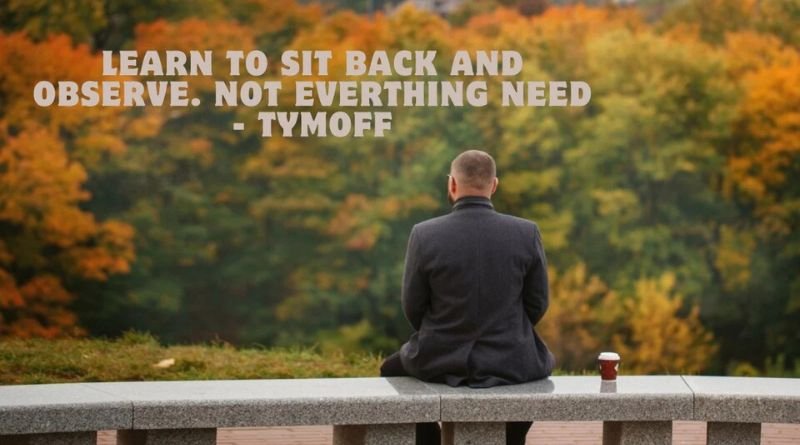In a fast-paced world where we are often expected to respond instantly to messages, situations, or even social media notifications, it can feel unusual to simply observe without reacting. Yet, the wisdom of sitting back, observing, and choosing our responses thoughtfully has been emphasized in many philosophies and self-development teachings. The quote, “Learn to sit back and observe. Not everything needs a reaction,” attributed to Tymoff, encourages a powerful mindset shift that can help us lead more peaceful and balanced lives.
This article explores the benefits of observing without immediately reacting, why it’s essential, and how you can practice this approach in your everyday life.
Table of Contents
The Power of Observation Over Reaction
1. Gaining Perspective
- Observation allows you to understand a situation better by looking at it from all angles. When you react instantly, you may not have the time to fully process what’s happening. By taking a step back, you can view the bigger picture, understand motivations, and make better decisions.
2. Reducing Stress
- Constantly reacting to everything around us can lead to burnout and stress. This is particularly true in today’s digital world, where notifications, news alerts, and social updates are constant. Observing rather than reacting gives your mind a break and helps you conserve energy.
3. Improving Relationships
- In conversations or arguments, responding immediately often leads to misunderstandings or escalated tensions. By observing first, you gain clarity, can empathize more deeply, and often respond more thoughtfully, which strengthens your connections.
4. Cultivating Emotional Intelligence
- Observation is a cornerstone of emotional intelligence. It gives you time to assess your own feelings, understand why you’re experiencing them, and regulate your emotions. This skill is especially useful in challenging situations, where reacting impulsively might lead to regret.
Practical Steps to Become an Observer
1. Pause and Breathe
- The simplest way to avoid reacting instantly is to take a few deep breaths before responding. This gives your brain a moment to shift out of “reaction mode” and into “observation mode.” Practice mindful breathing to ground yourself in the present.
2. Ask Yourself Why
- When you feel the urge to react, ask yourself why. What is triggering this response? Often, recognizing the reasons behind your reactions helps you to respond more thoughtfully, or even realize that no response is necessary.
3. Reflect on Past Reactions
- Take some time to think about situations where reacting quickly didn’t benefit you. This reflection will help reinforce the value of patience and observation and will encourage you to continue building this habit.
4. Embrace Silence
- Sometimes, silence can be more powerful than words. Embrace silence as a tool for reflection and watch how it changes the dynamics of your interactions. When others expect a quick response, taking a moment or even saying “I’ll think about it” can lead to more meaningful conversations.
5. Practice Mindfulness Meditation
- Mindfulness meditation helps you develop a non-reactive awareness of your thoughts and emotions. Practicing mindfulness daily can enhance your ability to observe without reacting, making this approach a natural part of your life.
Benefits of Observing Without Reacting
- Better Decision-Making: Observation gives you the clarity to make well-thought-out decisions.
- Enhanced Self-Control: Developing patience strengthens your ability to control impulses, which benefits all areas of life.
- Deeper Insights: Observing gives you time to notice details and patterns, which can lead to deeper insights and understanding.
- Personal Growth: Observation helps you learn about your own tendencies, helping you grow personally and professionally.
FAQs
1. What does it mean to observe without reacting?
- Observing without reacting means taking in a situation fully and thoughtfully before choosing how or whether to respond. It involves watching, listening, and understanding without the immediate need to act or voice an opinion.
2. How can I improve my observation skills?
- Practice mindfulness, listen actively, and make a conscious effort to delay your responses. Over time, you’ll notice that you’re naturally more observant and less reactive.
3. Isn’t reacting necessary in some situations?
- Absolutely, some situations require immediate responses, especially those involving safety or urgency. This approach is more about balancing instant reactions with thoughtful ones where possible.
4. How can observing first help in my relationships?
- Observation allows you to listen more effectively, respond with empathy, and avoid misunderstandings. By not reacting impulsively, you show respect for others’ perspectives and create a more open and supportive environment.
5. Can observing without reacting improve mental health?
- Yes, observing without reacting reduces stress, helps you regulate emotions, and fosters a calmer mindset. This practice can positively impact your overall mental well-being by promoting patience and resilience.
Conclusion
The practice of sitting back and observing rather than reacting aligns with a more peaceful, thoughtful way of engaging with the world. It empowers us to make choices based on insight rather than impulse and leads to more harmonious relationships, better decision-making, and improved emotional health. By cultivating this mindset, you may find yourself navigating life’s challenges with greater ease and resilience. So, next time you feel the urge to react, take a step back, observe, and see what clarity arises.



